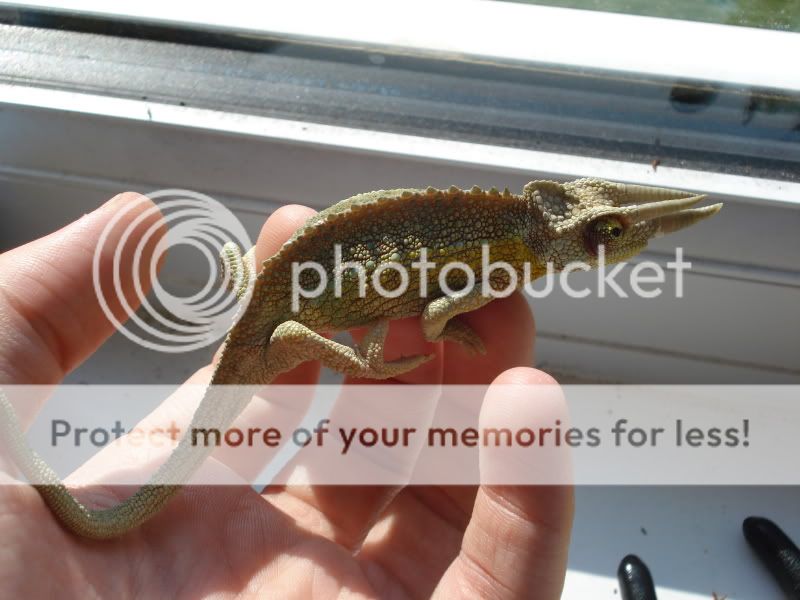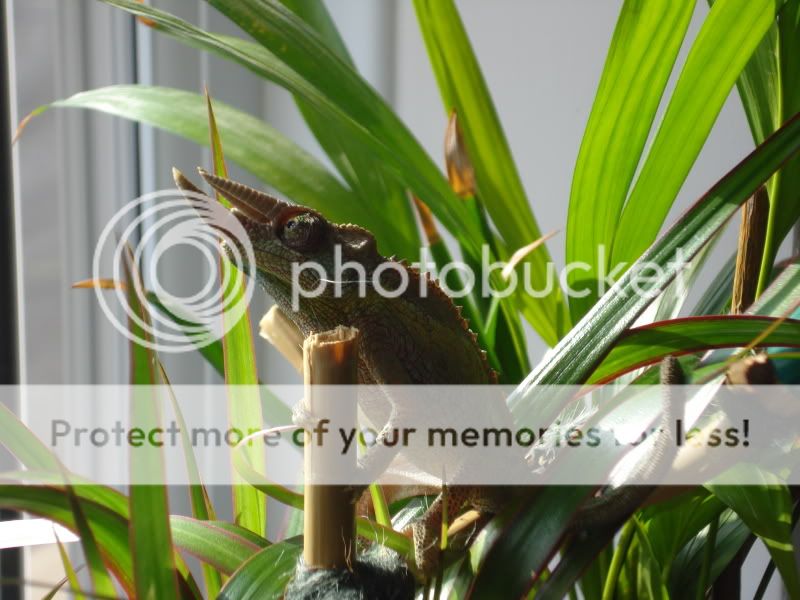Samuel L Jacksonii
New Member
Hi there, this is my first post on the forums, and I wish it was under better circumstances. Despite the fact that it's too late to do anything now, I'll post up the details:
Chameleon Info:
Your Chameleon - Jackson's Chameleon (Chamaeleo jacksonii jacksonii), male, age unknown, had been in my care for 10 days.
Handling - Only when necessary - once or twice when I adjusted things in the enclosure for a few seconds at a time (after moving him out of his enclosure I sat him on a houseplant outside his enclosure in the sun and he hung out there while I was doing stuff)
Feeding - Only ever saw him eat two locusts, day after I got him home he defecated a half-digested waxworm that I guess he must've eaten from the bowl I left in there. First one he ever dropped (first night I had him) had a white urate and an orange, runny fecal component, the rest of them looked normal and solid. Livefood was gutloaded and supplemented appropriately.
Supplements - Gutloading with varied vegetables, was planning on dusting once a week with calcium but he only ever got one round of that...
Watering - Heavy misting 3-4 times a day, enclosure allowed to dry out between mistings. Dripper running with drainage directly out of enclosure - water was always available and I'd seen him drink several times.
Fecal Description - First dropping was orange with white urate. Second had a half-digested waxworm in it. Rest seemed normal. Do not know if he had been tested for parasites previous to me having him.
History - Bought from an exotic pet shop, when i bought him he didn't seem particularly happy - he was pretty brown when I got him home, but I put that down to stress of the journey. He started to colour up slowly over the next few days but never as vibrant as some of the Jackson's I've seen on here. He was wild-caught, but apparently a long-term captive.
Cage Info:
Cage Type - Exo-terra flexarium 38.
Lighting - Basking spot - 60w household bulb. UV - exo-terra repti-glo 10.0 tube.
Temperature - Temps measured with infared digital temp gun, Basking spot hovered around 82-85f and ambient was no lower than 70 down to the cage floor where the temperature dropped, nighttime temps never dropped below 65.
Humidity - Humidity 80-100 after spraying, humidity maintained with regular daily (thorough) spraying. Dripper also available.
Plants - Ficus, hibiscus, bromelia guzmania. They're intact so I know he's not been picking at them.
Placement - Cage is in my bedroom. I barely spend any time in there except to sleep, once the chameleon's lights were off I crept around and didn't switch on any lights in order to avoid disturbing him. I also didn't spray deodorant, etc, anywhere near the room. A crested gecko is also in the room but there is no sightline between the two enclosures. The top of the cage is about 2m off the floor.
Location - United Kingdom, Southeast England.
So what happened?
Last night he seemed absolutely fine. I'd got him home Friday before last (the 18th). I'd been instructed that a glass enclosure would be fine but after doing a bit more research on here and other places it seemed that the general consensus was mesh enclosures were the only way to go for Jacksons, so I switched him over to a flexarium within a few days. I saw a marked improvement, he started colouring up, saw him feed. He was solid and seemed happy until yesterday, when I caught him sleeping during the day briefly. He woke up and started drinking within a few minutes of me seeing him, so I made a note to keep an eye on him for the rest of the day and he seemed fine.
When his lights went off for the night, I left the room to give him some time to get to sleep. I came back five minutes later to check on him and he was scraping about in the ficus at the back of his enclosure, but I couldn't see anything. When I got a light on him, he was lying, on his side, on the very floor of his enclosure, struggling to breathe and moving lethargically. He'd started to go a very sickly shade of creamy-yellow, like old paper. I picked him up and had him flat on my palm and he didn't even make any attempt to stand, and only weak attempts to grip my fingers.
It was then that I noticed he was bleeding from his cloaca - he wasn't losing blood in torrents or anything, but it was a substantial trickle down half the length of his tail. I switched on his lights and put him near the basking spot to keep him warm while I sorted out a plan of action, but it was too late by then. He went a few vibrant colours (unfortunately, the most vibrant I've seen since I got him), gaped several times and had a bit of a painful-looking spasm. And then he let out a clicking breath and was gone.
I'm pretty upset if I'm honest - he was one of the most interesting reptiles I've owned, and I'd got quite attached to the little guy. I just wondered if anyone may be able to shed some light on why he might've gone so quickly? I'll be sorting out a post-mortem as soon as I can but I kinda wanna figure out if it's down to my husbandry that's killed him so fast or if something like that may have been lingering from his time in the pet shop and just set off by the stress of the move.
Chameleon Info:
Your Chameleon - Jackson's Chameleon (Chamaeleo jacksonii jacksonii), male, age unknown, had been in my care for 10 days.
Handling - Only when necessary - once or twice when I adjusted things in the enclosure for a few seconds at a time (after moving him out of his enclosure I sat him on a houseplant outside his enclosure in the sun and he hung out there while I was doing stuff)
Feeding - Only ever saw him eat two locusts, day after I got him home he defecated a half-digested waxworm that I guess he must've eaten from the bowl I left in there. First one he ever dropped (first night I had him) had a white urate and an orange, runny fecal component, the rest of them looked normal and solid. Livefood was gutloaded and supplemented appropriately.
Supplements - Gutloading with varied vegetables, was planning on dusting once a week with calcium but he only ever got one round of that...
Watering - Heavy misting 3-4 times a day, enclosure allowed to dry out between mistings. Dripper running with drainage directly out of enclosure - water was always available and I'd seen him drink several times.
Fecal Description - First dropping was orange with white urate. Second had a half-digested waxworm in it. Rest seemed normal. Do not know if he had been tested for parasites previous to me having him.
History - Bought from an exotic pet shop, when i bought him he didn't seem particularly happy - he was pretty brown when I got him home, but I put that down to stress of the journey. He started to colour up slowly over the next few days but never as vibrant as some of the Jackson's I've seen on here. He was wild-caught, but apparently a long-term captive.
Cage Info:
Cage Type - Exo-terra flexarium 38.
Lighting - Basking spot - 60w household bulb. UV - exo-terra repti-glo 10.0 tube.
Temperature - Temps measured with infared digital temp gun, Basking spot hovered around 82-85f and ambient was no lower than 70 down to the cage floor where the temperature dropped, nighttime temps never dropped below 65.
Humidity - Humidity 80-100 after spraying, humidity maintained with regular daily (thorough) spraying. Dripper also available.
Plants - Ficus, hibiscus, bromelia guzmania. They're intact so I know he's not been picking at them.
Placement - Cage is in my bedroom. I barely spend any time in there except to sleep, once the chameleon's lights were off I crept around and didn't switch on any lights in order to avoid disturbing him. I also didn't spray deodorant, etc, anywhere near the room. A crested gecko is also in the room but there is no sightline between the two enclosures. The top of the cage is about 2m off the floor.
Location - United Kingdom, Southeast England.
So what happened?
Last night he seemed absolutely fine. I'd got him home Friday before last (the 18th). I'd been instructed that a glass enclosure would be fine but after doing a bit more research on here and other places it seemed that the general consensus was mesh enclosures were the only way to go for Jacksons, so I switched him over to a flexarium within a few days. I saw a marked improvement, he started colouring up, saw him feed. He was solid and seemed happy until yesterday, when I caught him sleeping during the day briefly. He woke up and started drinking within a few minutes of me seeing him, so I made a note to keep an eye on him for the rest of the day and he seemed fine.
When his lights went off for the night, I left the room to give him some time to get to sleep. I came back five minutes later to check on him and he was scraping about in the ficus at the back of his enclosure, but I couldn't see anything. When I got a light on him, he was lying, on his side, on the very floor of his enclosure, struggling to breathe and moving lethargically. He'd started to go a very sickly shade of creamy-yellow, like old paper. I picked him up and had him flat on my palm and he didn't even make any attempt to stand, and only weak attempts to grip my fingers.
It was then that I noticed he was bleeding from his cloaca - he wasn't losing blood in torrents or anything, but it was a substantial trickle down half the length of his tail. I switched on his lights and put him near the basking spot to keep him warm while I sorted out a plan of action, but it was too late by then. He went a few vibrant colours (unfortunately, the most vibrant I've seen since I got him), gaped several times and had a bit of a painful-looking spasm. And then he let out a clicking breath and was gone.
I'm pretty upset if I'm honest - he was one of the most interesting reptiles I've owned, and I'd got quite attached to the little guy. I just wondered if anyone may be able to shed some light on why he might've gone so quickly? I'll be sorting out a post-mortem as soon as I can but I kinda wanna figure out if it's down to my husbandry that's killed him so fast or if something like that may have been lingering from his time in the pet shop and just set off by the stress of the move.






